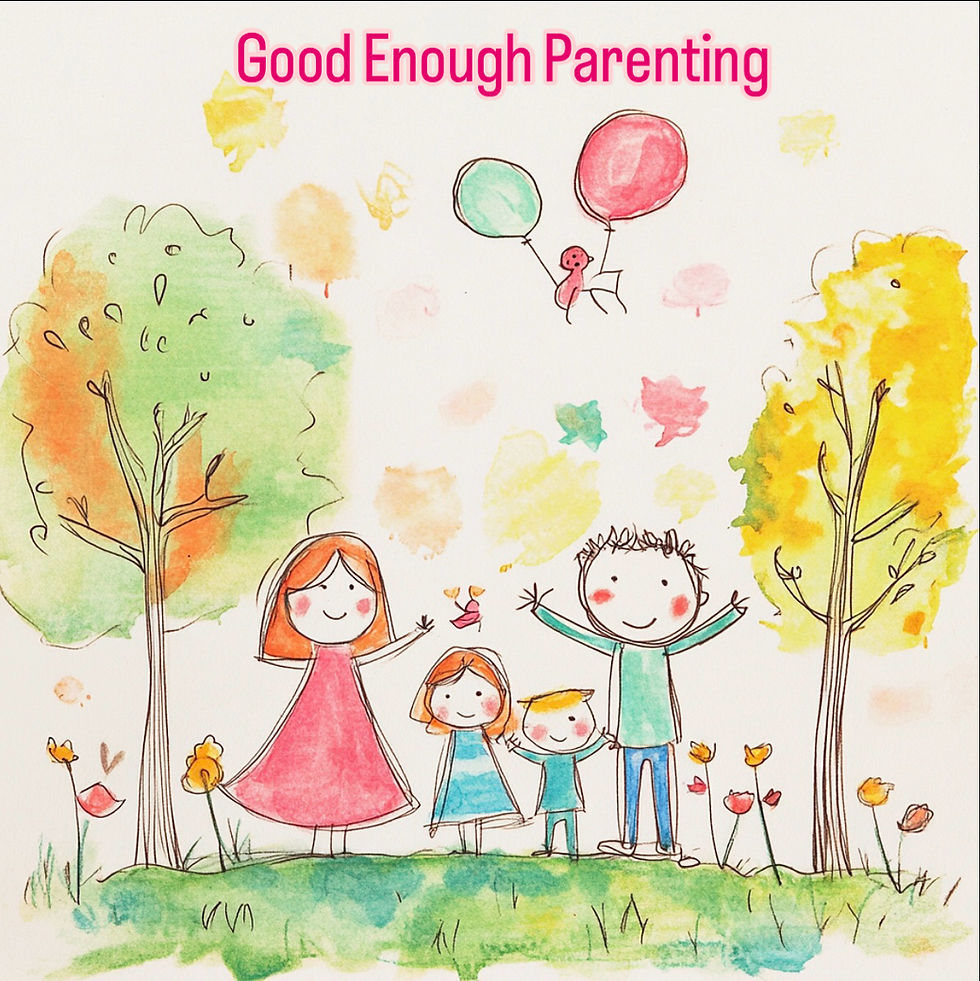“Good Enough” Parenting
- Zeynep Okur Guner, PhD

- Aug 22, 2025
- 4 min read
Perfect parenting is the enemy of good parenting.”
Dr Aliza Pressman

More than twenty years ago, when I was at school, doing a master’s programme on developmental psychology, I was introduced to the term ‘good enough mother’. Back then, I was a young student nowhere near having a child, yet I remember thinking ‘what a compassionate and kind concept that everyone who raises a child should know about.’
Years later, I became a mum. I wish I could tell you that I have repeatedly reminded myself of this concept every time I made a mistake, lost my temper, raised my voice (or dare I say ‘yelled’), or missed an opportunity for connection with my daughter because I was too busy with our daily schedule. I wish! That parental guilt of not being enough, not doing enough or catastrophising every mistake we make with our children seems almost like a standard operating procedure of parenting. So today, I want to talk about why it shouldn’t be the case.
Good Enough Mothering
Donald Winnicott, a British pediatrician and psychoanalyst, coined the term ‘good enough mother’ to celebrate everyday, ordinary, devoted mother as opposed to this idea of perfect mother with perfect parenting skills. He states in his 1973 book “Playing and Reality”:
“Perfection belongs to machines and the imperfections that are characteristic of human adaptation to need are essential quality in the environment that facilitates.”
In other words, Winnicott suggests that making mistakes and missing out of connection opportunities with our children are not only inevitable but also desirable for our children’s development, and that striving to be a perfect parent can cause some unintended challenges for children. He explains that parents are always ready to care for their newborns’ needs but as months go by, parents naturally loosen up with their responsiveness in healthy ways as the child grows and develops. By not being available and responsive to our children’s needs 24/7, we actually help our children develop skills to tolerate frustration, accept life’s inevitable disappointments, failures and losses. Through our imperfections, mismatches and slip ups; self regulation, resilience, and social competence develop.
This is not just a reassurance to parents and caregivers that mistakes are OK, but that our imperfections at our parenting are simply necessary for our children’s healthy development.
This, of course, is not about abusive parenting or neglect. It isn’t about providing bare-minimum parenting so our kids can toughen up for real life, either. It is simply about being consistently responsive to our children’s needs but just not all the time. Winnicott recognises that human beings simply cannot achieve perfection all the time and when it comes to parenting that is not even desirable. When we consciously or unconsciously strive for perfection, feel guilty of not being or doing enough for our children, we, in a way, rob them from necessary experiences such as disappointment, trial and errors that will prepare them for real life. Not to mention the anxiety, worry, and self questioning we put ourselves through day in day out. Therefore, it is better for our children’s development to be a good enough parent rather than a perfect one.
Time for Self-Compassion
“One of the basic rules of universe is that nothing is perfect…Without imperfection, neither you nor I would exist.”
Stephen Hawking
If I ask you to give yourself a score on your parenting, what would you give? And what score would you consider to be a good enough parent?
……
I think, it can come as a relief to know that as long as we are B-’ing at our parenting, psychologists like Dr Aliza Pressman and Dr Lisa Damour consider it good enough parenting; that optimum level of being consistently (as opposed to always) present, reliable, responsive. A research conducted by Ed Tronick suggests that as long as we are responsive and available to our children’s cues and needs 20 to 30% of our daily encounters, we are doing enough for building strong attachment and providing good enough parenting. In other words, as long as we are usually reliable and our children are well-cared for, failures and slip ups are OK. B- is not that bad, right? No wonder, Winnicott suggests that ‘most mothers are naturally good enough”. Maybe we should give ourselves a tap on the shoulder and show some self compassion, instead of setting unrealistic parenting goals and putting ourselves through enourmous pressure.
When we do not strive for perfection, it also becomes easier to reflect on our parenting mistakes and try to make ammends as we are not treating each mistake as a catastrophe that will ruin our child’s life. Self-reflection on our mistakes can lead to repair with our children. Since mistakes are inevitable, repair is one of the most important aspects of developing healthy and string attachment and hence relationships with our children. Repair is one that deserves its own newsletter.
“I would rather be the child of a mother who has all the inner conflicts of the human being than be mothered by someone for whom all is easy and smooth, who knows all the answers, and is a stranger to doubt.”
Donald Winnicott
If you wish to read more on this subject:
Winnicott D., (1971), “Playing and Reality”, London, Routledge
Pressman A., (2024), “The Five Principles of Parenting: Your Essential Guide to Raising Good Humans”, London, Headline
Damour L., (2023), “The Emotional Lives of Teenagers: Raising Connected, Capapble and Compassionate Adolescents”, NY, Random House
Tronick E., Gold C., (2020), “The Power of Discord: Why the Ups and Downs of Relationships are Secret to Building Intimacy, Resilience and Trust”, London, Scribe
Tronick E., (2007), “The Neurobehavioral and Social-Emotional Development of Infants and Children”, NY, Norton



Comments